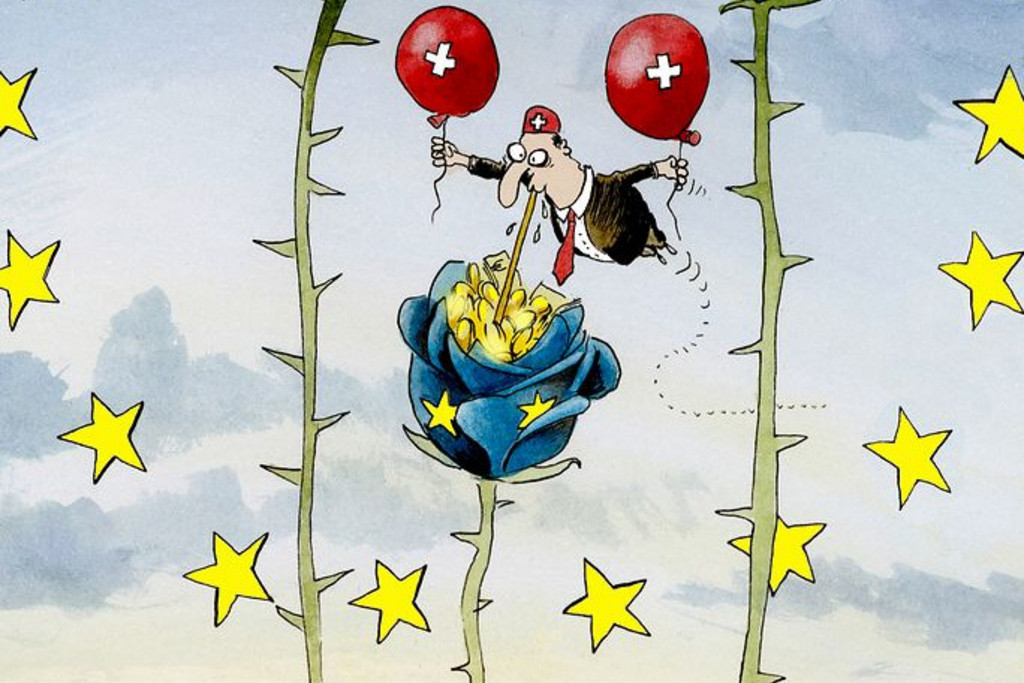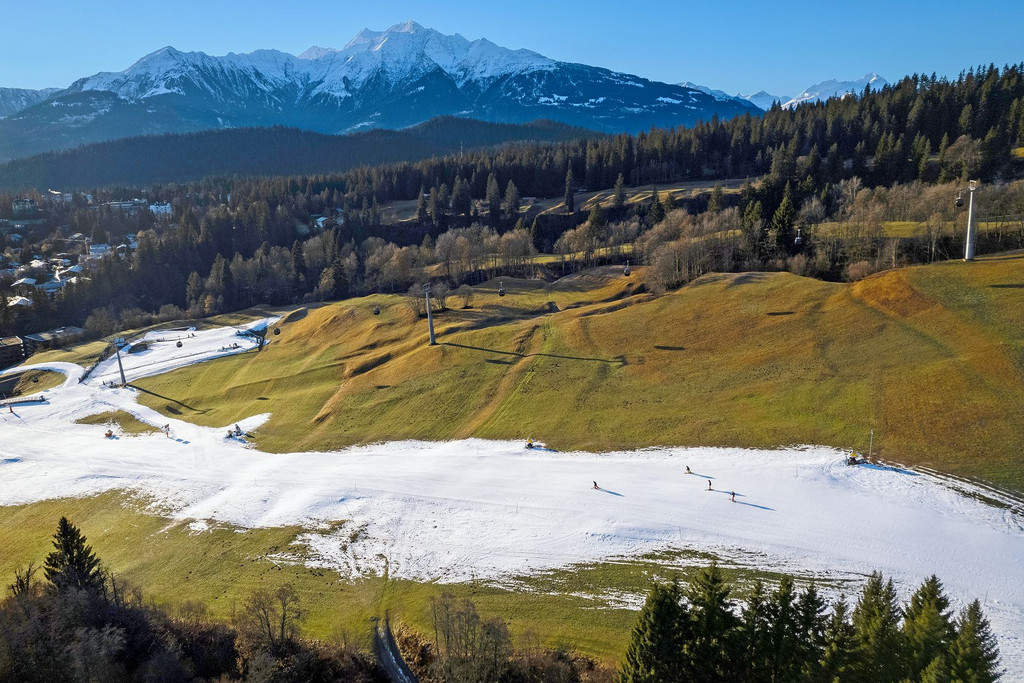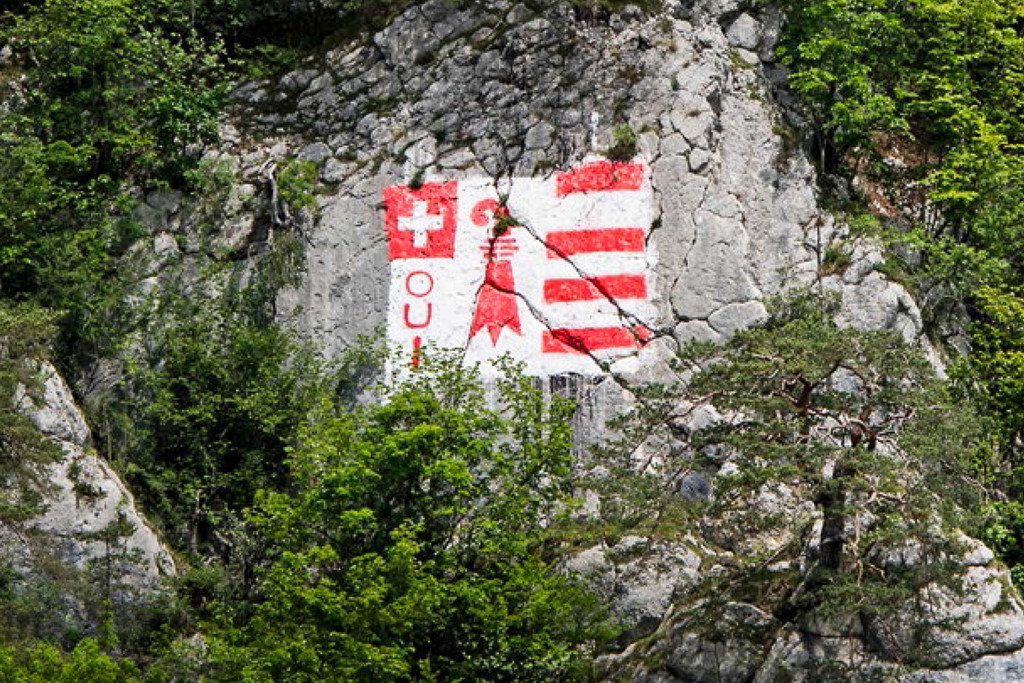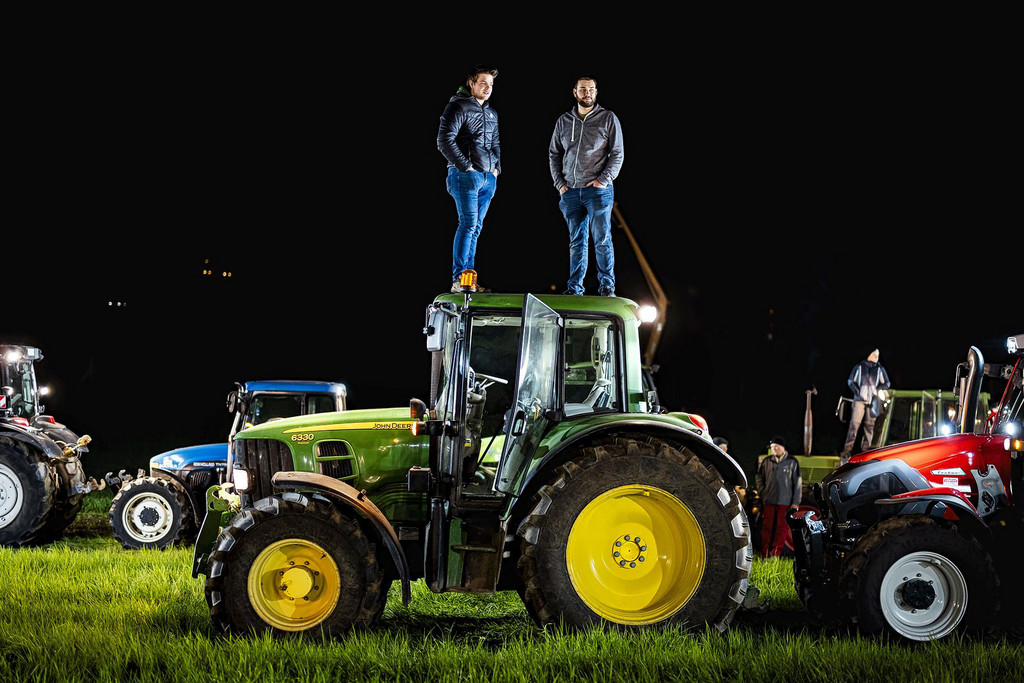
- Focus
An outside perspective on Switzerland
17.08.2015
The election campaign in Switzerland is in full swing and obviously the candidates and parties are making lots of promises about the future. The election campaign nevertheless also provides an opportunity for reflecting on the past few years. We have therefore invited two observers, the correspondents from two leading foreign newspapers, “Le Monde” and “Süddeutsche Zeitung”, to share their insights into Swiss politics and the election campaign with the Swiss Abroad.
Switzerland torn between openness and protectionism
The last legislative period was marked by the nation’s desire to escape the European crisis... but in vain. The same issue will have a major influence on the forthcoming federal elections.
Marie Maurisse, “Le Monde” correspondent in Switzerland
Switzerland has spent the past four years walking a tightrope. On one hand, it has attempted to avoid contagion by the crisis rocking the European Union at all levels – economically and politically. On the other, it has sought to continue supporting Swiss growth, which depends heavily on trade with and labour from neighbouring states. Three key events have illustrated the difficulty faced by the nation in maintaining this delicate balance.
On 9 February 2014, the Swiss people supported the reintroduction of immigration quotas by voting yes to the popular initiative put forward by the Swiss People’s Party (SVP), the country’s biggest political party. The result was a political bombshell and presented a headache for the Federal Council. The self-sufficient tendencies of the Swiss people contrast starkly with the reality of the situation faced by Switzerland, where companies desperately need foreign workers in order to operate. Is it politics that determines the state of the economy or vice-versa? The Federal Council has to find a way forward but the “Get out of the blind alley. Don’t reintroduce immigration quotas!” committee wants the Swiss people to vote again. The coming months will prove decisive.
End of the minimum rate and banking secrecy
The other indicator of Switzerland’s swaying between autonomy and dependence is the decision by the Swiss National Bank (SNB) on 15 January to abandon the minimum rate introduced in 2011 to counteract the appreciation of the Swiss franc. Thomas Jordan, chairman of the SNB, now believes that artificially keeping the currency at reasonable levels is too expensive. Companies have to manage on their own to remain competitive despite the strong Swiss franc. Swiss SMEs and the tourism industry are flagging, and the central bank is being put under pressure. Regardless of whether it wants to be or not, Switzerland is not an island in the heart of Europe, and its GDP is heavily influenced by the euro crisis.
Moreover, the country no longer wants to go it alone. That is the final point of this synopsis. On 27 April, Berne signed an agreement on the automatic exchange of information with the European Union that will effectively bring an end to banking secrecy from 2017. This is a Swiss speciality which has disappeared in favour of a globalised system based on the transparency of banking flows. This development will not be restricted to foreign clients holding accounts in Switzerland, as the experts believe the Swiss themselves will undoubtedly renounce banking secrecy soon. That is assuming the popular initiative entitled “Yes to the protection of privacy”, which is to be voted on at referendum over the coming months, is not approved by the Swiss people.
Swiss politics under European influence
Switzerland’s heart remains torn between openness and protectionism. Antoine Chollet, a political scientist at the University of Lausanne, believes the SVP has won a symbolic battle. The European Union has increasingly less credibility in the eyes of the Swiss, and the idea of accession has completely disappeared from the agendas of the Swiss parties. “Swiss politics nevertheless remains highly influenced by Europe,” according to this expert, the author of the book “Défendre la démocratie directe” (Defending Direct Democracy). In his view, “the consequences of the end of the minimum rate and the referendum of 9 February, two sovereign decisions, will indicate to what extent we are dependent on the countries surrounding us”. The SVP’s performance at the forthcoming elections will set the tone.
More courage, fewer aperitifs
The Federal Council has set a topic that could act as a pointer in the election campaign.
Charlotte Theile, Switzerland correspondent for the “Süddeutsche Zeitung”
The campaigning for the National Council elections has been going on at least since February. Roger Köppel, editor-in-chief and publisher of “Weltwoche” who has been appearing on all the talk shows in Germany, declared that he wanted to enter Parliament for the SVP in Zurich. In fact, it was not so much that he wanted to but that he had to. He felt compelled owing to the “disastrous policies of the left-wing majority in Berne”. His candidacy – and concerns over pushing long-serving SVP politicians down the list – was the main election campaign issue for almost two months. The SVP caused the next big stir in April. Magdalena Martullo-Blocher, CEO of Ems-Chemie and Christoph Blocher’s daughter, also decided to stand for election, not in Zurich but in Grisons. The headline in the German weekly newspaper “Die Zeit” was “Hooray, hurrah, everyone to Chur”.
The battle over Blocher’s political legacy
What would the high-profile newcomers bring? This was not evident. Would the SVP succeed in using the refugee crisis in the Mediterranean for its own political ends? There was also uncertainty over this. While political scientists are observing a slight “shift to the right”, the FDP is more likely to benefit from this. It comes as little surprise that the main issues over recent months have been related to the economy. The Swiss have been experiencing first-hand since January what it means to live with a safe-haven currency. Kilometre-long tailbacks of cars heading towards Germany to go shopping, longer working hours for the same salary and the relocation of industrial jobs – the consequences of the strong Swiss franc are real and tangible. What answers Switzerland can provide to this currency crisis remains to be seen given that it is stemming from Greece and the EU. Nevertheless, economic competence seems a more important factor in this election campaign than in the past. That said, the election campaign has not yet really got going. The major parties are primarily focussing on mobilising their core voters – free aperitifs rather than addressing issues. And the “course-setting elections” forecast by SP President Christian Levrat – right or left, an outward-looking perspective or isolationism, social democracy or economic liberalism – is actually a claim that could be made every four years.
The Federal Council nevertheless set a topic at the end of June that could act as a pointer this summer. The negotiations with the EU are to be restructured over the coming weeks. There is to be a chief negotiator who will now not just discuss the new provisions on immigration but also research matters, institutional cooperation and the European electricity market. The Federal Council anticipates the initial proposals by the autumn. If such a package-solution approach were to come off, this would represent a resounding success for Swiss diplomacy. Taking a step further towards “fitting a square peg into a round hole” – as many people called the implementation of the immigration quotas adopted in 2014 – would be good news for the Federal Council shortly before the elections. But Berne is taking a big risk with this strategy. Even though the EU has refused to negotiate, the expectation has been raised in Switzerland that an outcome to negotiations will soon be achieved.
Attention given to mavericks
A few candidates creating a stir, economic issues and perhaps some success with a relaxed negotiating strategy – these do not sound like major surprises during the elections. A good deal of attention is being dedicated to even tiny parties, such as the Artists’ List whose own estimations indicate potential support of less than one percent. Their ideas may sound similar to those of the Greens or SP – the environment, refugees, education and EU relations. The well-known author Ruth Schweikert nevertheless believes a new party is needed. That means room for utopian ideas and unconventional candidates. The artists have hit upon an important point here – courageous ideas and new and perhaps also awkward politicians are probably the best thing that could happen to the election campaign over the coming weeks.











![[Translate to English:]](/fileadmin/_processed_/3/7/csm_max-spring-3-cartoons-de_3c29839370.png)

Comments
Comments :
Was, ums Himmelswillen bringt Sie auf die euforische Theorie, dass
in der verknöcherten Schweiz mutige Politiker mit neuen Ideen, die auch querliegen können, auch nur angehört, um nicht gerade zu sagen ausgegrölt, zu Erfolgen kommen könnten?
An sowas auch nur zu denken ist reine Utopie.
Da wird jeder, auch nur vernünftige Vorschlag, vom braunen Sumpf
überschrieen, ausgegrölt. Die Saat geht doch auf, wir nähern uns
einer Situation, da die grösste Regierungspartei das braune Stimmvieh geradezu sucht, um damit einen möglichen EU-Beitritt zu verhindern. Denn das ist das Trauma von dem SVP (schweiz. Verarschungspartei) Guru Blocher. Aus was für Gründen auch immer